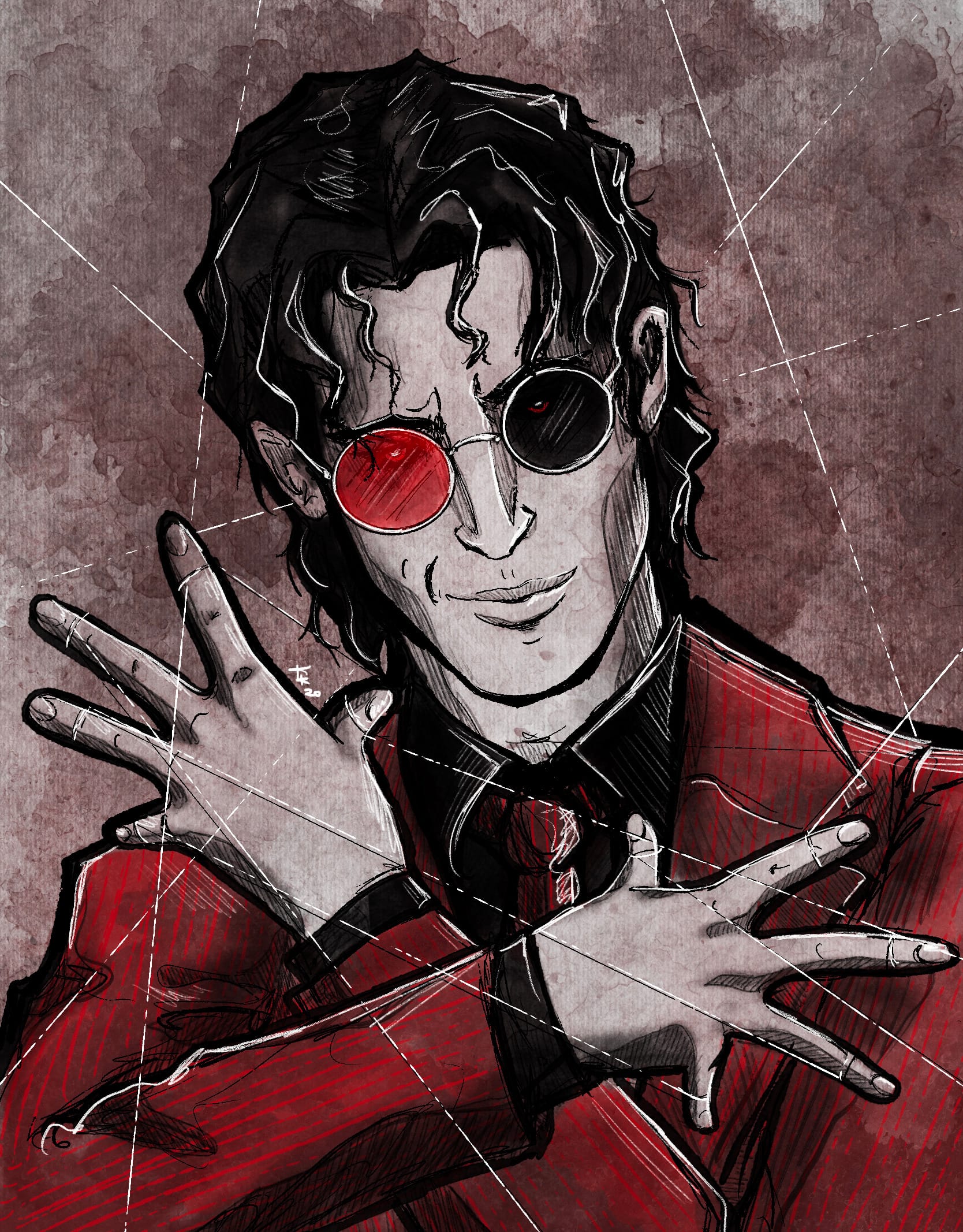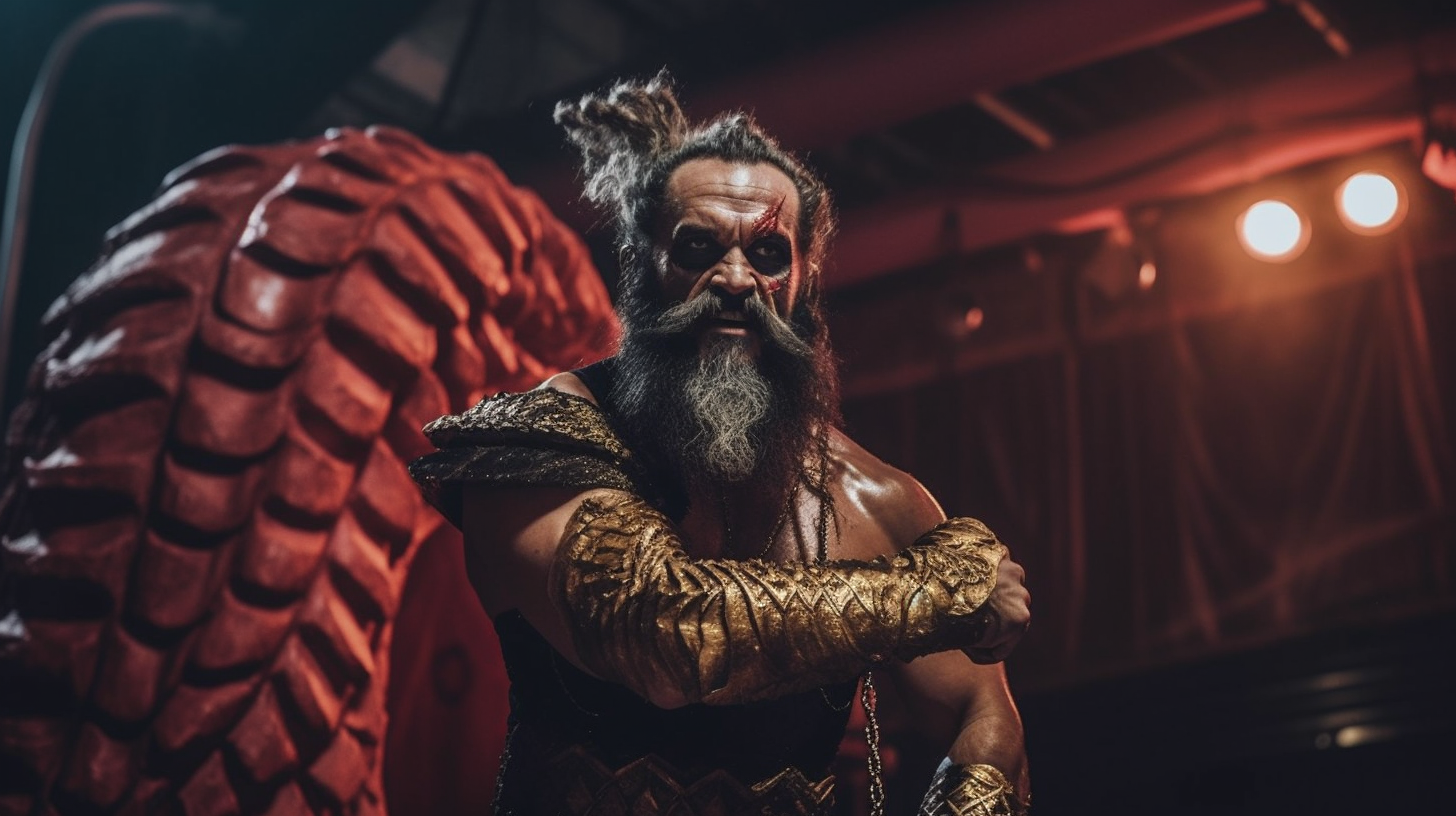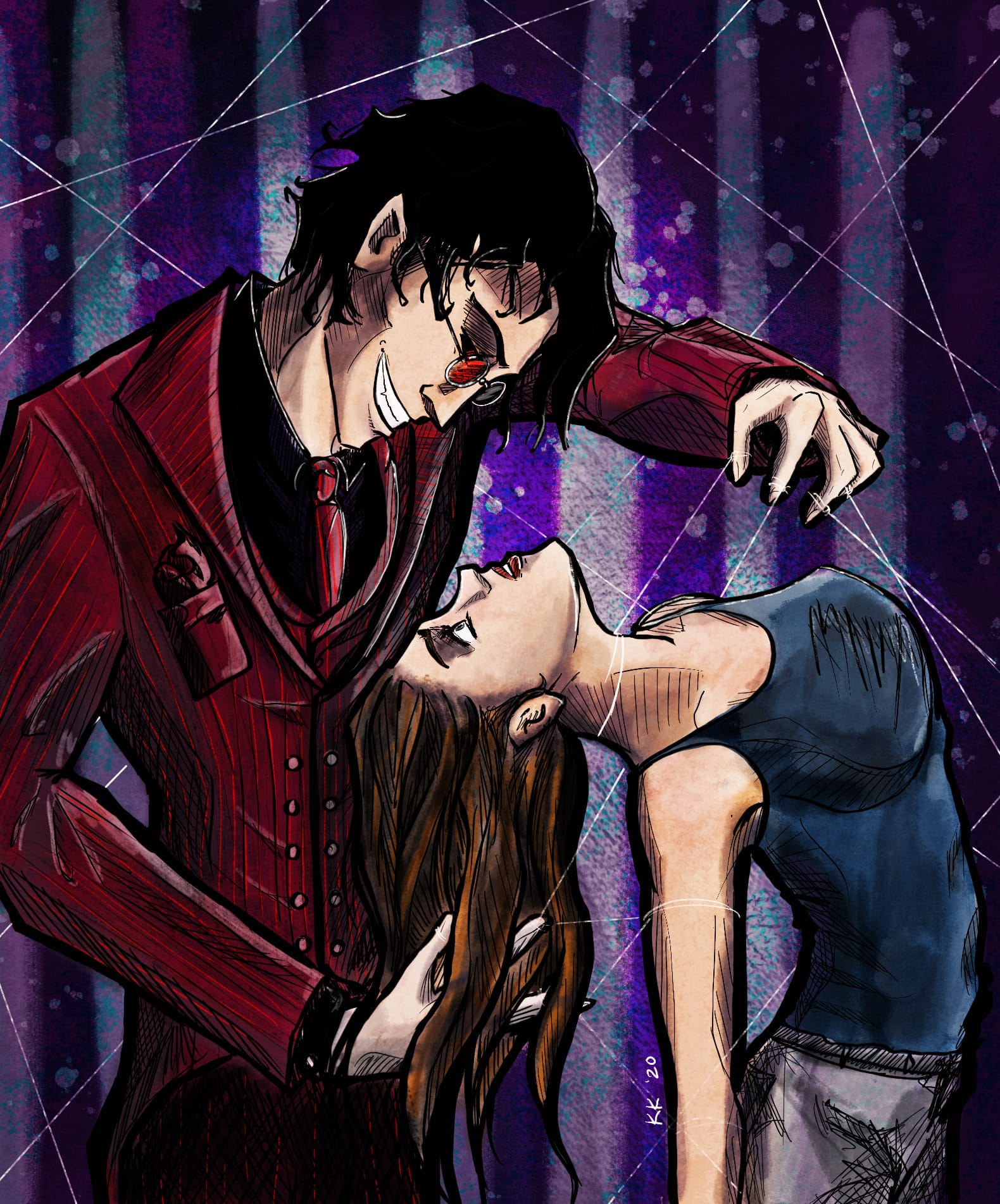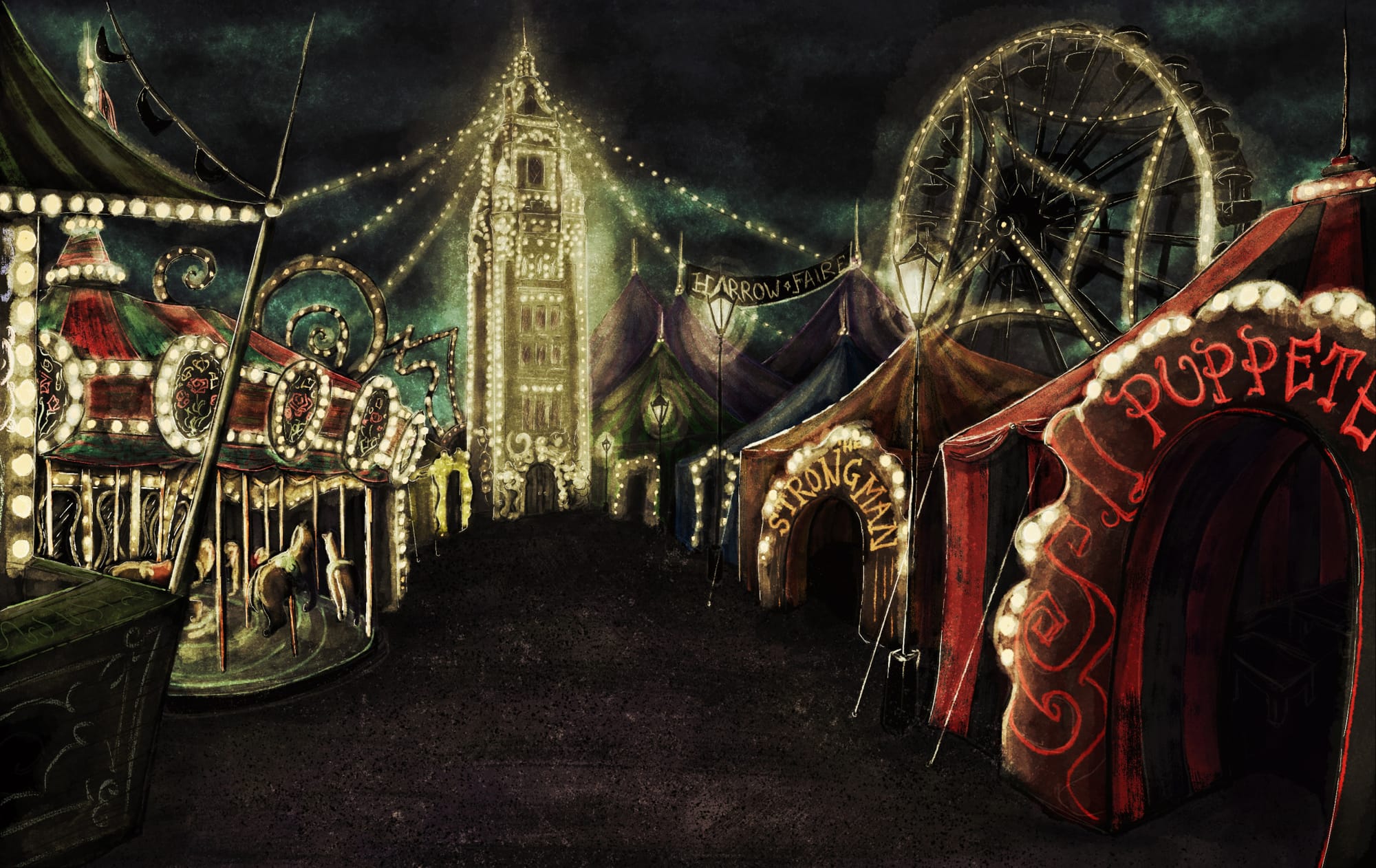Love is a verb. A critical discussion of Harrow Faire

I read Harrow Faire while investigating how to write the villain-heroine situationship into my work-in-progress fantasy novel. Authored by Kathryn Ann Kingsley, Harrow Faire is a 'villain horror/fantasy romance' set in a long-abandoned circus that unexpectedly... comes to life.
I wanted to review Harrow Faire because I REALLY enjoyed the characters, world building and moral dilemmas. I love dark fantasy/fantasy horror, and there was some wonderful stuff here. HOWEVER, although it was fun as a 'sexy fantasy' (i.e. with no correspondence to the real world), I felt it mixed up a 'hot, toxic fling' with a 'serious, committed relationship' in a way that could mislead, and potentially harm, younger readers.

It's not the first 'romance' I've read that tries to sell lust as equivalent to love, and portrayed love as something felt/spoken about, and not earned. And, as a sexual abuse survivor, I felt obliged to talk about that. Harrow Faire is understandably a very popular series, with > 3,500 GoodReads ratings for the first book, and frequent Reddit recommendations, so I hope this balances out the discussion.
Content warnings for blunt explicit discussions of sexual abuse, non-vanilla sex acts, dubcon, and such-like.
Out damned darkness...
[Some big spoilers here]
Harrow Faire is Shakespearian tragedy at its finest. Set in contemporary America, the story follows heroine, Cora Glass, who feels she's lost her life purpose due to chronic pain from Ehler-Danhos syndrome. Having given up her dreams as a photographer, she feels depressed and trapped.
One day, she sees a deserted local fairground, Harrow Faire, which appears to have 'magically' come back into operation.

Visiting with her friends, she chooses to go through the 'dark' entrance where - she's told - she will trade free entry for a tiny part of her individuality (seity). While inside, she's terrorised by a creepy guy who claims to have stolen her favourite colour and offers to take her pain away.
That night, she has a nightmare about Simon, a very tall, beautiful man with inhuman eyes who paints in blood. He's a creepy puppeteer who has decided to trick Cora into agreeing to turn herself into a living doll.

Soon, Cora is terrorised at night by Simon (and his living shadow), who invades her dreams. Strange photographs appear on her camera, and it seems the circus itself is sending her creepy clues. Fearful for the life of her best friend, who is having a fling with the circus strongman, she returns to the circus where she's eventually captured by Simon - only to be saved by the circus Ringmaster.
The Ringmaster transforms her into the Contortionist, a role missing from the undead/immortal circus troupe. Over the next few books, she discovers that Harrow Faire is an eldritch horror that takes the form of a circus to feed off fragments of people's personalities. It's broadly benign, however, and seems to enjoys human company, but it's dying - slowly murdered by a performer who sees it as evil.
The moral dilemma is whether Cora should aid the circus, saving the lives of the performers, or whether she should sacrifice them - and herself. Without giving too many spoilers, she chooses to allow the circus to continue feeding on humanity, but the consequences of her compassion are to become an eldritch horror herself.
If you like dark fantasy, Cora's slow moral corruption and the creepy living carnival are super-interesting. Each performer is an imaginative take on a circus trope. I especially enjoyed the zookeeper, Rudy, with his naga tail and weird menagerie (1). Harrow Faire, which periodically vanishes into a pocket dimension, is both an atmospheric setting and an interesting character in its own right.

HOWEVER...
I've effectively summarised the entire plot of a five-book series. There just isn't much plot. And the reason, unfortunately, is that Kathryn Ann Kingsley wasn't really interested in writing a dark fantasy-horror. All the imaginative setting and moral dilemmas were mere window-dressing for the burgeoning 'romance' between Simon and Cora.
For example, about 75% of Book Three is Cora being tied up in anatomically improbable sexual positions with puppet strings. On the bed in the performers' boxcars... in her own tent... in the Puppeteer's tent... If you want to read a fantastically hypermobile woman being erotically tied up in the shower of a vintage stationary caravan for pages and pages AND PAGES. THIS IS YOUR BOOK.
Me... I had... issues...
Whilst reading the Harrow Faire series, I watched this absolutely brilliant four-hour video by Rachel Oates, which describes in depth how the relationship between Simon and Cora romanticises abuse. Despite agreeing with everything Rachel says, I wanted to nuance her thoughts slightly (as above, I'm also a sexual abuse survivor, but from three decades back).
The relationship between Cora and Simon is clearly abusive. He tries to trap Cora in a living doll to 'consume' her memories - in Book One, just for the sheer hell of it (unsure why, it's never mentioned again), and again in Book Two when he thinks she might destroy the fair. During the same period, he drags her around with puppet strings and breaks into her boxcar while she's asleep.

However, Cora finds him physically attractive, even telling him he's 'tall and sexy' when he first appears to her in a dream. In Book Two, she agonises endlessly over how she's strangely drawn to him, despite him being a 'murderous psychopath'. He takes advantage of this by preventing her (and the reader) speaking to other circus performers, out of jealousy, and by following her around the Faire.
If the timelines of these novels made sense, I can understand why he's stalkery. There's only so many puppets you can craft on a single fairground in 160 years. He fancies her. She fancies him, and it would be obvious she's scared, not uninterested. He does nothing to make her less scared, but - like a pesky, hot guy at a holiday camp - his persistence eventually pays off.
By the time we get 18% into Book Three, she's drunkenly kissing him, and they're having wild sex in her boxcar by the 38% mark.
Every woman has a crazy side...

Simon is MASSIVELY popular with readers on GoodReads and, unlike Rachel (I suspect), I really do understand why. He has a dark sense of humour, high intelligence, and manic charisma. It's a villain archetype that is very sexy.
If you imagine him younger and conventionally better looking, Simon has this energy. I'm sure there is fanfic of Dr. Who's Toymaker. There must be fanfic.
I've always found fictional villains attractive. They are usually funnier, smarter and more cynical than heroes, and more likely to break rules (even if this has terrible consequences). They're often outsiders, too-often depicted as disabled or neurodivergent, and with a powerful drive to upend the status quo.
Overthrowing the established order is surprisingly often a good thing in fantasy, because the genre is typically reactionary and regressive. Overthrowing absolute monarchy, implementing world-shattering social change, and forging new magic is traditionally done by the villain. The hero is usually a protege of the 'true king', chosen to inherit the throne - despite dynastic dictatorships leading to bad real-world government.
And, thanks to Saruman, Middle Earth finally went through the industrial revolution, with new technologies available to a society subjugated by absolute monarchy, unable to vote for new leaders, and with the peasantry of the Shire too poor to afford even shoes. Within a century of this scene, The Prancing Pony was taking text message bookings and using Apple Pay for drinks.
Villains are also more likely to be adventurous in bed, with the strait-laced hero rarely being written as into rough sex, kink, etc. This is a trope that Kathryn Ann Kingsley also draws upon with Simon, who really likes tying Cora up with Puppeteer strings (2).
Fantasies are... fantasies...

The difficulty with Harrow Faire is that the relationship between Cora and Simon isn't portrayed as steamy sex with a profoundly toxic man. Instead, from Book Three onwards, it's suddenly depicted as a passionate romance for all the ages.
The books tell us that Cora needs to accept Simon as he is, a man with psychotic breaks and a hair-trigger temper, who trashes his boxcar and rips apart fellow immortals with magic puppet wire, before forgetting what he's done.
But that's okay. Cora just needs to love him. And he just needs to admit to Cora (using his words) that he loves her.
Simon, of course, never loses the psychotic breaks, jealousy and explosive temper (he is a villain, after all). But he and Cora get married, regardless, at the end of Book Five.
Two months after meeting each other...
In a carnival that spends most of the series trapped in a pocket dimension...

And now they're touring America, running the circus together, responsible for the welfare of patrons (and the other performers)...
For eternity...
But it's okay, folks. Because they're in LURRVVVEEEE.
You (the mature reader) knows this five-book series depicts the eldritch equivalent of marrying the guy you just met at summer camp. It's a Shakespearian tragedy that continues beyond the final pages. At some point, they'll have a fight. He'll lose his sh**t. And Cora, gifted with death powers by the Faire, will either leave him a lifeless husk. Or let him rip chunks out of her, like a sexy Kenny.
Even I can see this toxic relationship is due to flame out, and I'm only in my mid-40s. I'm amazed that Harrow Faire, an eldritch horror of unimaginable age, tried pushing this couple together, especially when everyone in the Faire now depends on Cora's organisational skills (and sanity).
Love is what you do...
The problems with Harrow Faire come down to a single issue - timescale.
The entire series take place over about two months. During these two months, Simon goes from trying to kill Cora to proposing to her. And Cora goes from a sexual assault survivor, who was anally raped by her ex-boyfriend, to being totally 100% cool having dubcon anal with Simon in Book Five.
Just to be clear what's wrong with this (3), I took fifteen years to have a new relationship after I was repeatedly flashed/sexually assaulted by my first boyfriend. Even then, I was so traumatised by memories, especially of the flashing, that I couldn't stand the sight of a penis. It took two years to have penis-in-vagina sex for the first time because I tensed in terror.
But, sure, Simon - a serial killer who has psychotic episodes - can work Cora through her trauma, and into rough sex, spanking and restraint within a mere 60 days. She doesn't trust him and is genuinely fearful of him. True terror, rather than Misattribution of Arousal, where people feel more sexual excitement in a situation of fake peril, such as taking your date onto a suspension bridge.

It would have been better to spread Book Two and Three over several years to allow Cora and Simon to get to know each other. The Faire doesn't need to be under imminent peril. Maybe they could face some plot events together, where we realise he's manic, evil and dangerous but... also, in emotional sync with her? And then, the story can move from "Cora wants to get tied up in Simon's shower" to "Cora wants to adult with Simon". Because real people don't (or shouldn't) get married just because they're fucking.
Weddings are the original happy ending for a reason. If you're going to end with a wedding, I want to be able to imagine the happy couple enjoying their subsequent life. I don't want to imagine them, a week after the epilogue, ripping each other into shreds outside a gas station in rural Idaho, and the subsequent complex multi-jurisdictional eldritch divorce.
Out Damned Plot...
Book One and Book Five were fast-moving with excellent tension, with Harrow Faire and Simon battling to capture Cora's seity, and then Simon and Cora struggling to defeat the Ringmaster and save the Faire. However, the middle books were largely filler material: Cora agonising over decisions for pages, repetitive Simon-Cora banter and endless sex scenes, before a dramatic cliffhanger leading into the next book.
It's a good indie sales model, but a waste of moral dilemma, world-building and characterisation. It also made Simon and Cora's relationship super-abusive because they didn't do/face anything together as a couple until Book Five, meaning Cora's trust in Simon was never earned.
And that's the trouble, really. You can lust after someone instantly, passionately and obsessively. I've done this. I'm married to the guy. You can also meet someone who is as darkly funny, intelligent, and sarcastic as Simon (happily, minus the psychosis and serial killing... (4). I've done this too. The same guy.
You can come to trust them, adore them, want to spend your life with them... Yep, same guy.
But it takes years of work...
Of coming through serious life s**t with them.
Of writing your own story together.
Because, whether you're fighting eldritch horrors, or just infertility, love isn't a feeling.
Or a word you say.
Love is what you DO.
In summary, love is a verb.
FOOTNOTES:
- I didn't like how the poor Ringmaster got turned into a morally-rigid Muslim extremist in book five for... reasons.
- While reading 'bad boy' historical romance for social script/writing tips, I realised fictional Georgian/Regency schools must have had cunnilingus on the curriculum. Regardless of the male character's social class, personality, or which book series he was in, the minute he got into a room with the heroine, he was straight down on his knees. By the third historical romance, I was praying for an unexpected stocking fetish - just to freshen things up.
- While re-reading the anal sex scene, I noticed the MOST horrifyingly hilarious thing in the ENTIRE series... Simon uses lube. Harrow Faire creates EVERYTHING in the Faire - either magicked out of the performers' memories, or by them explicitly asking. And, thus, I couldn't help imagining Simon howling into the void, demanding basicallyAzathoth rustle up a tube.

- When he read this, the man in question quirked an eyebrow, and asked, "You don't know?" (about the serial killing). He's joking, obviously...
